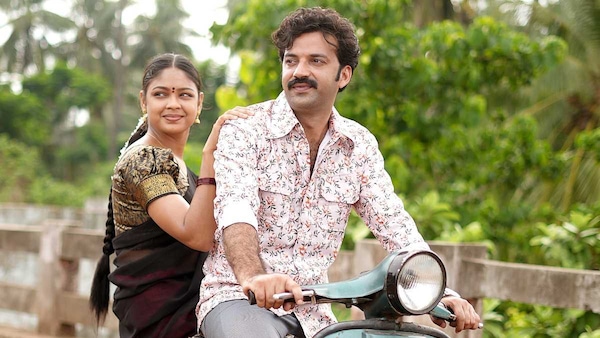Annapurna Photo Studio review: This low stakes thriller comedy is a warm, nostalgic trip to the 80s
Director Chendu Muddu’s film is very self-aware, knows its limitations and revels in its simplicity and innocence

Last Updated: 02.35 PM, Feb 26, 2024
Story:
Chanti, Prasad, Pandu are friends who run a small-time videography business for in the 80s. Chanti, in his late 30s, falls in love with a college-going village belle Gauthami while his friends constantly mock him for his age and luck with women. While trying to save an unknown woman in the street, Chanti and Prasad land in a mess. When an NRI Sindhu and her uncle Jagadish arrive in the village, all hell breaks loose.
Review:
Director Chendu Muddu, the brain behind the deceptively entertaining O Pitta Katha, sets the story of his sophomore film in an idyllic Godavari backdrop in Andhra Pradesh. The film revolves around ordinary men, women with no huge ambitions, who need to be street-smart in their response to a tricky scenario. It’s mildly thrilling, largely entertaining and an instant source of nostalgia.
The conflict in this tale is frail and delicate though the USP of the film is its innocence, warm depiction of interpersonal relationships, offering a homage to a style of humour that mainstream cinema rarely produces today. The director smartly uses the 80s backdrop to drive a story centred on a crime where the cops struggle to put the pieces of a puzzle together.
The response to the film is largely dependent on a viewer’s appetite for nostalgia and their ability to look at the simplistic story with innocence. The film unfolds through the lens of two cops who decode a case through a suicide note. The comedy in the film is a product of the protagonist’s not-so-happening career, his timidity to express his love and his verbal banters with his friends.
Right from its title referring to ANR, the film is packed with mentions of several hit Telugu films of the 60s and 70s; there are bell-bottom pants, langa vonis, chetaks, video cassettes and the rural ambience reminds one of the Jandhyala and Vamsee era in the 80s. Even the dream song Rangamma has the leads recreating the iconic poses from popular numbers, where they run around trees, with cheeks and chins touching one another and the petals embrace as a suggestive gesture.
The filmmaker uses a few smart tricks in sustain the liveliness in the proceedings. The narrative goes back and forth between the past and the present, generating tension through the cops’ reactions to the protagonist’s backstory. The situational humour is its strength, but there are enough events in the film to keep the viewer invested.
The milieu is intentionally traditional and conservative - the parents want to get their daughters married immediately after their education, all the girls want is to live a life with the man of their dreams and there are ample discussions on horoscopes too. The filmmaker rightly doesn’t glorify these segments but just mirrors life in Telugu households many decades ago. The occasional joke on ‘rape’ could’ve been avoided though.
It’s refreshing in many ways to see a middle-aged protagonist who is vulnerable and sportive about reacting to humour on his age. The depiction of romance is in good taste. One wished the director focused more on writing better character arcs for Chanti’s friends Pandu, Prasad and Sindhu. Yet, it doesn’t affect you much because you view the story through Chanti’s words and he’s naturally the ‘hero’ of his story.
There are dips in momentum in the latter half of the film - the comedy is rather tiresome beyond a point and the narrative gathers pace only with the arrival of the NRI girl and her uncle. The conflict and the ‘partly convenient, convoluted’ resolution are a mixed bag and there could’ve been more tension in the story if one were to take them seriously.
From the appropriate choice of locations to the innovative colour play, lighting (cinematographer Pankaj Tottada) and the equally impressive production design and Prince Henry’s superb music score, Annapurna Photo Studio seals the deal with its technical finesse. SP Charan’s number Rangamma and its picturisation is one of the many high-points of the film.
Chaitanya Rao, in his first feature as a lead, makes the most of a role that offers immense scope to showcase his histrionic talents and his ability to underplay comedy is an asset for the film. Lavanya Sahukara, as the simple, feisty college-going girl, is another wonderful find and her efforts to stay true to the 80s, with her body language, looks and expressions meriting praise.
This is also among Viva Raghava’s best performances to date, precisely because the director doesn’t reduce him to a sidekick and gives him great scope to improvise in several witty sequences. Lalith Aditya, Uttara Reddy, and Mihirah, cast in familiar, relatable roles, make a mark while Yash Rangineni’s evil-uncle act needed more meat. The supporting cast Krishna Mohan, Ramana, Shiva perform well within the limitations of their characters.
As a director, Chendu Muddu proves he’s not a one film wonder and has a unique storytelling style that bridges yesteryear cinema sensibilities with a modern twist.
Verdict:
Annapurna Photo Studio is an entertaining thriller comedy brimming with innocence, whose smart screenplay makes up for its wafer-thin plot. It’s a warm, nostalgic trip to the 80s with impressive performances, loads of humour, backed by memorable music and vibrant cinematography.
Subscribe to our newsletter for top content, delivered fast.

